Much has been made of Bogarde’s five-film partnership with Joseph Losey, but Basil Dearden comes a close second* – he and Bogarde made four films together, beginning with ‘The Blue Lamp’.
‘Victim’ was their third outing and a pivotal film both in Bogarde’s career and in the history of British cinema. At the time of its release in 1961, homosexuality was still illegal in Britain. The so-called “Buggery Act” of 1533 wasn’t repealed until 1967. (Four hundred and thirty four fucking years to overturn an utterly pointless law … I’m straight, but I’m damned if I understand why homophobia runs so deep.) ‘Victim’ led to questions being asked in the House, to the law against homosexuality being re-evaluated and – finally – repealed.
Dirk Bogarde and Basil Dearden – along with scriptwriters Janet Green and John McCormick – played a part in changing the law … for the better. I raise a glass to them.
‘Victim’ opens in a burst of energy as Barrett (Peter McEnery), a young labourer on a building site, panicking as he sees a police car pull up outside the site office, goes hurtling along a vertiginously high section of scaffolding, rides a rickety makeshift lift down to the ground, and takes to his heels. He petitions various friends for help in getting out of London, but is rebuffed. He places a call to respected barrister Melville Farr (Bogarde), who brusquely curtails the conversation, hanging up on him. Arrested at a transport café, he hangs himself in police custody.
The lad’s crime? Fiddling the wages on the building site, claiming for non-existent employees. The police note his spartan lifestyle (a flea-bitten bedsit; nothing in the way of creature comforts), and conclude that he was skimming the money to pay off a blackmailer.
From this point on, ‘Victim’ dons the mantle of a taut, moody crime thriller (the guilt-ridden Farr determining to expose the blackmail ring), which it wears comfortably till the end credits. Yet, between the generic set-pieces (including a heavy-handed red herring subplot designed to conceal the blackmailer’s identity), a much more serious film emerges. A film about social attitudes, and about one man’s refusal to live in denial any longer.
Regarding social attitudes, ‘Victim’ is both ahead of its time and very much grounded in its time. It’s ahead of its time because it refuses to portray its gay characters as mincing and effeminate (“cissies”, to use the colloquialism of the day), but as fully rounded and (mostly) sympathetic characters. Indeed, the most ambivalent character is Sandy (Derren Nesbitt), the blackmailer’s hired muscle. Full-lipped, almost lisping, an etching of a male nude on his apartment wall, there’s no doubt that he’s a study in repression, right down to his name (cf. popular British radio show ‘Round the Horne’ in which Kenneth Williams played a camp shop-owner given to exclaiming “Oooooh hello, I’m Julian and this is my friend Sandy”).
It’s grounded in its time in terms of its vocabulary. Farr’s wife Laura (Sylvia Syms) recoils from garage-door graffiti reading “Farr is a queer” – fast forward four decades and the word has been reclaimed by the gay community – and cannot bring herself to say the word when pressed. In a fantastic scene between Farr and Laura (and kudos to Sylvia Syms for a performance that attains glass-shattering intensity by dint of being so controlled), the barrister owns up to “seeing” Barrett even though he realised they might both be compromised; Laura asks why; Farr rounds on her – “Because I wanted him!” Bogarde’s absolute frustration is held in cinematic equilibrium by Syms’s glacial response. Watch the film and you’ll barely breathe as this scene plays out, it’s that powerful.
‘Victim’ achieves true greatness in this scene – and in at least one other (where Farr, taunted that he married Laura out of guilt, loses his professional cool and throws a punch at someone who, all things considered, has basically spoken the truth). In these moments, the film’s subtext breaks cover and eviscerates the screen. Farr is by no means the hero of the piece. He’s a man who’s spent his life denying himself, denying his very nature. By the end, he stands to lose everything just by doing the right thing. In the final scene, when Laura, despite everything, offers her support, Farr finally accepts who he is. Bogarde reins his performance in admirably (oh, the power of understatement). Part way through, he turns away and coughs, as if the very words he is trying to say had become stuck in his throat. That one cough says it all.
*Actually, Losey and Dearden come second and third respectively, since Bogarde’s most frequent director was Ralph Thomas – the, ahem, ‘talent’ behind ‘Doctor in the House’ and its turgid sequels, as well as formulaic but crowd-pleasing fare like ‘Campbell’s Kingdom’ and ‘The Wind Cannot Read’. He and Bogarde made nine films together. For the purposes of this article, though, I’m factoring in artistic integrity and showing Ralph Thomas the red card.
Saturday, December 08, 2007
Subscribe to:
Post Comments (Atom)
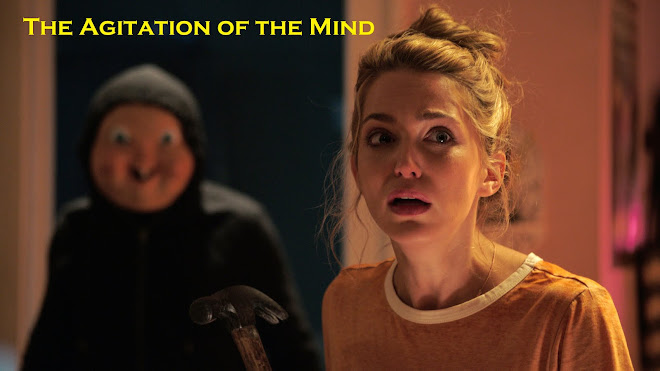

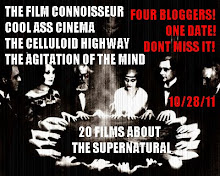
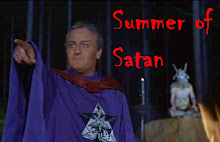
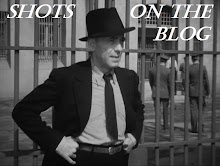











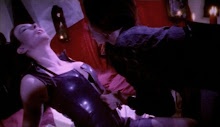





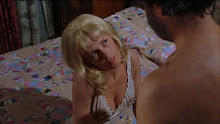









2 comments:
"Victim" is on at the moment on late night national television (ABC) here in the Antipodes. They seem to have a vault of recyclable old movies to program the wee small hours, so I've seen it a few times.
I was wondering about what impact the movie had at the time, so I googled it, and ended up here.
Nice work, this blog. My partner is a movie reviewer for radio, I keep telling her she should blog, I'll show her yours as an example of the form being not completely vacuous.
Back to "Victim": you say at the time questions were raised in the house. Can you provide more detail? I'm looking for examples of "The Arts" as instrument of social change.
Cheers from The Colonies.
Thanks for your comments, Frederick. Let me know if your partner ever decides to blog, I'd be interested in her opinions on cinema.
'Victim' was released in Britain a few years after the Wolfenden Report (http://en.wikipedia.org/wiki/Wolfenden_report) was published, recommending that "homosexual behaviour between consenting adults in private should no longer be a criminal offence". This was the first serious challenge to the Buggery Act since it was decreed in 1533, as well as flying in the face of early-60s social prejudices.
The Wolfenden Report's recommendations were passed in the House by only a very narrow margin; however, the laws against homosexuality were finally overturned.
'Victim' played a key part in challenging social attitudes, demonstrating how the gay community was preyed upon by blackmailers (the detective in 'Victim' refers to the laws against homosexuality as "the blackmailer's law"). Basically, the film helped make the issue public and encourage discussion, allowing a climate under which the Wolfenden recommendations were acted upon.
Regards from the cold climes of the UK,
Neil
Post a Comment